英语易错辨析
小升初英语介词易错点辨析单选题50题
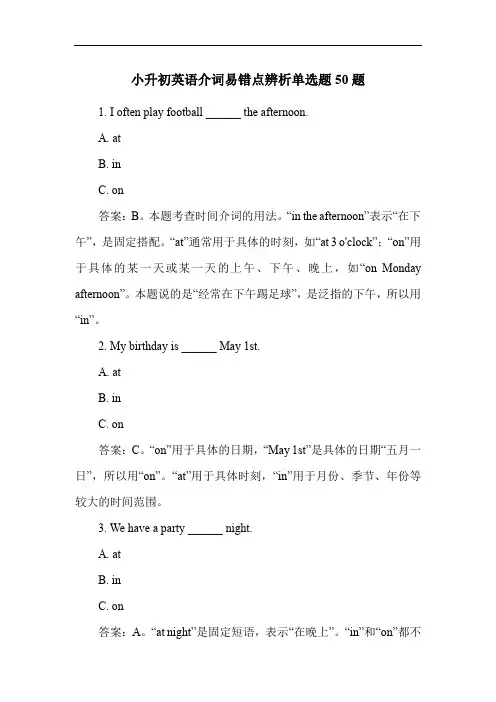
小升初英语介词易错点辨析单选题50题1. I often play football ______ the afternoon.A. atB. inC. on答案:B。
本题考查时间介词的用法。
“in the afternoon”表示“在下午”,是固定搭配。
“at”通常用于具体的时刻,如“at 3 o'clock”;“on”用于具体的某一天或某一天的上午、下午、晚上,如“on Monday afternoon”。
本题说的是“经常在下午踢足球”,是泛指的下午,所以用“in”。
2. My birthday is ______ May 1st.A. atB. inC. on答案:C。
“on”用于具体的日期,“May 1st”是具体的日期“五月一日”,所以用“on”。
“at”用于具体时刻,“in”用于月份、季节、年份等较大的时间范围。
3. We have a party ______ night.A. atB. inC. on答案:A。
“at night”是固定短语,表示“在晚上”。
“in”和“on”都不与“night”这样搭配。
4. He gets up ______ six o'clock every morning.A. atB. inC. on答案:A。
“at”用于具体的时刻,“six o'clock”是具体的时刻“六点”,所以用“at”。
“in”用于时间段,“on”用于具体日期。
5. They have a class meeting ______ Monday morning.A. atB. inC. on答案:C。
“on”用于具体的某一天的上午、下午或晚上,“Monday morning”是具体的“周一上午”,所以用“on”。
“at”用于具体时刻,“in”用于不具体的时间段。
6. There is a big tree ___ the house.A. in front ofB. in the front ofC. at front ofD. at the front of答案:A。
【英语】英语非谓语动词易错剖析含解析
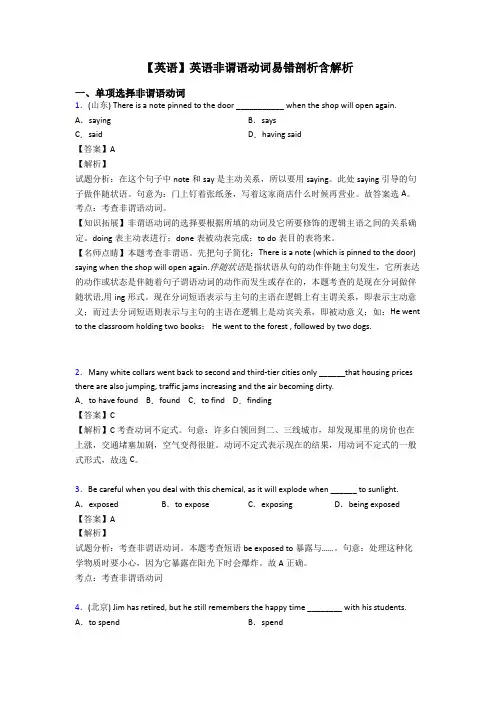
试题分析:在这个句子中note和say是主动关系,所以要用saying。此处saying引导的句子做伴随状语。句意为:门上钉着张纸条,写着这家商店什么时候再营业。故答案选A。
考点:考查非谓语动词。
【知识拓展】非谓语动词的选择要根据所填的动词及它所要修饰的逻辑主语之间的关系确定。doing表主动表进行;done表被动表完成;to do表目的表将来。
考点:考查非谓语动词作状语
10.IPhone, the world’s largest mobile phone maker, said that over the first nine months of the year it ________ 23 million handsets in China, an increase of 77 percent ________ the same period a year ago.
【名师点睛】本题考查非谓语。先把句子简化:There is a note (which is pinned to the door) saying when the shop will open again.伴随状语是指状语从句的动作伴随主句发生,它所表达的动作或状态是伴随着句子谓语动词的动作而发生或存在的,本题考查的是现在分词做伴随状语,用ing形式。现在分词短语表示与主句的主语在逻辑上有主谓关系,即表示主动意义;而过去分词短语则表示与主句的主语在逻辑上是动宾关系,即被动意义;如:He went to the classroom holding two books;He went to the forest , followed by two dogs.
2.Many white collars went back to second and third-tier cities only ______that housing prices there are also jumping, traffic jams increasing and the air becoming dirty.
小升初英语语音易错点辨析单选题40题
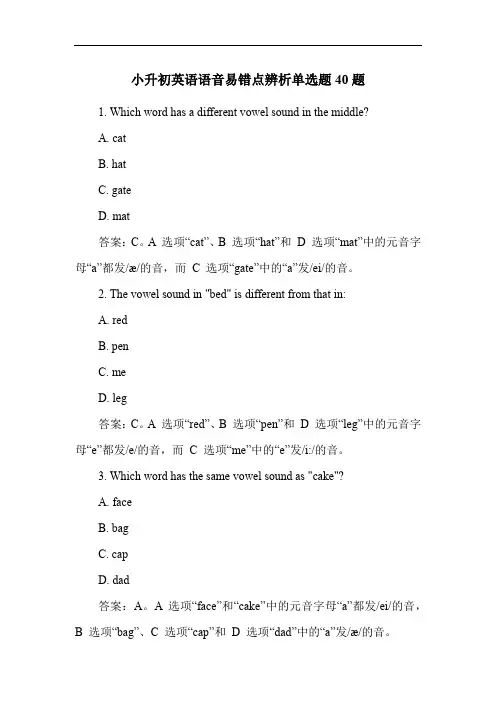
小升初英语语音易错点辨析单选题40题1. Which word has a different vowel sound in the middle?A. catB. hatC. gateD. mat答案:C。
A 选项“cat”、B 选项“hat”和D 选项“mat”中的元音字母“a”都发/æ/的音,而C 选项“gate”中的“a”发/ei/的音。
2. The vowel sound in "bed" is different from that in:A. redB. penC. meD. leg答案:C。
A 选项“red”、B 选项“pen”和D 选项“leg”中的元音字母“e”都发/e/的音,而C 选项“me”中的“e”发/i:/的音。
3. Which word has the same vowel sound as "cake"?A. faceB. bagC. capD. dad答案:A。
A 选项“face”和“cake”中的元音字母“a”都发/ei/的音,B 选项“bag”、C 选项“cap”和D 选项“dad”中的“a”发/æ/的音。
4. The vowel sound in "hot" is not like that in:A. dogB. notC. noteD. lot答案:C。
A 选项“dog”、B 选项“not”和D 选项“lot”中的元音字母“o”都发/ɒ/的音,而C 选项“note”中的“o”发/əʊ/的音。
5. Which word has a different vowel sound from the others?A. cupB. butC. busD. use答案:D。
A 选项“cup”、B 选项“but”和C 选项“bus”中的元音字母“u”都发/ʌ/的音,而D 选项“use”中的“u”发/ju:/的音。
英语初中英语句子结构及成分易错剖析
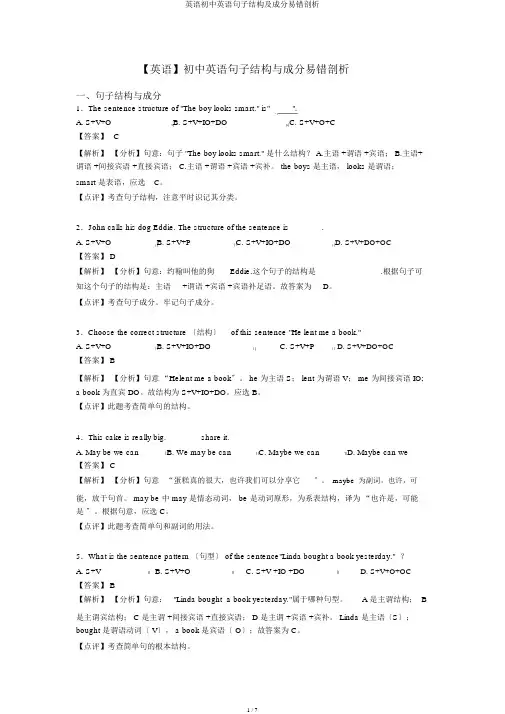
【英语】初中英语句子结构与成分易错剖析一、句子结构与成分1.The sentence structure of "The boy looks smart." is"".A. S+V+OB. S+V+IO+DOC. S+V+O+C【答案】C【解析】【分析】句意:句子 "The boy looks smart." 是什么结构? A.主语 +谓语 +宾语; B.主语+谓语 +间接宾语 +直接宾语; C.主语 +谓语 +宾语 +宾补。
the boys 是主语, looks 是谓语;smart 是表语,应选C。
【点评】考查句子结构,注意平时识记其分类。
2.John calls his dog Eddie. The structure of the sentence is _______.A. S+V+OB. S+V+PC. S+V+IO+DOD. S+V+DO+OC【答案】 D【解析】【分析】句意:约翰叫他的狗Eddie.这个句子的结构是_____________.根据句子可知这个句子的结构是:主语+谓语 +宾语 +宾语补足语。
故答案为D。
【点评】考查句子成分。
牢记句子成分。
3.Choose the correct structure 〔结构〕A. S+V+O B. S+V+IO+DO of this sentence "He lent me a book."C. S+V+PD. S+V+DO+OC【答案】 B【解析】【分析】句意“Helent me a book〞。
he 为主语 S; lent 为谓语 V; me 为间接宾语 IO;a book 为直宾 DO。
故结构为 S+V+IO+DO。
应选 B。
【点评】此题考查简单句的结构。
4.This cake is really big. _______ share it.A. May be we canB. We may be canC. Maybe we canD. Maybe can we【答案】 C【解析】【分析】句意“蛋糕真的很大,也许我们可以分享它〞。
【高中英语】易错分析:英语中12个典型的中国式错误

【高中英语】易错分析:英语中12个典型的中国式错误1.这个价格对我挺合适的。
错误:价格很贵。
正:thepriceisright。
注意:最常见的用法是以否定的形式出现在通知或通知上。
例如,以下项目不适合儿童。
以下项目不适合儿童。
这句话更适合用下面的说法。
2.你是做什么的呢?你的工作是什么?正:areyouworkingatthemoment?小贴士:你的工作有什么问题吗?对因为如果你谈话的人刚刚失业,这样直接的问题会丢面子,所以你必须问:你现在在工作吗?你在工作吗?然后你问:你现在在哪里工作?你最近在哪里工作?或者你在哪个行业工作?你在做什么工作?3.用怎么说?错误:怎么说?正:howdoyousaythisinenglish?小贴士:《怎么说》是中国最流行的中式英语之一。
这绝不是一句地道的英语谚语。
同样的句子是:这个词怎么拼写?请问你怎么拼写?这个词怎么发音?这个词怎么发音?4.明天我有事情要做。
错误:我明天有事要做。
正:iamtiedupalldaytomorrow。
小贴士:用“我有事要做”来表示你很忙也是完全中国化的。
因为我们一直都有事情要做,躺在那里睡觉也很重要。
所以你可以说我很忙,无法脱身:我累了。
那一次我不能去,但我不能,我要待在家里5.我没有英文名。
错误:ihaven'tenglishname。
正:idon'thaveanenglishname。
小贴士:很多人在说英语时都会犯这样的错误。
从分析的角度来看,它可能缺乏基本技能,因为have在这里是一个实词动词,而不是现在完成时的无意义助动词。
因此,当这个句子从肯定句变成否定句时,有必要添加助动词。
理解真相是一回事,习惯真相又是另一回事。
请再说几句:我没有钱;我没有兄弟姐妹;我没有兄弟姐妹,我没有车。
我没有车6.我想我不行。
错误:我想我不能。
正:idon'tthinkican。
小贴士:当中国人说“我想我不会”时,英语总是说“我想我不会”。
高中阶段易混易错英语词汇辨析100组
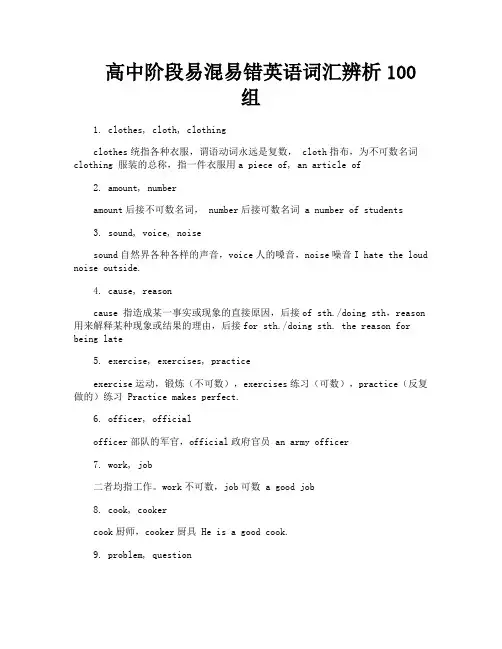
高中阶段易混易错英语词汇辨析100组1. clothes, cloth, clothingclothes统指各种衣服,谓语动词永远是复数, cloth指布,为不可数名词clothing 服装的总称,指一件衣服用a piece of, an article of2. amount, numberamount后接不可数名词, number后接可数名词 a number of students3. sound, voice, noisesound自然界各种各样的声音,voice人的嗓音,noise噪音I hate the loud noise outside.4. cause, reasoncause 指造成某一事实或现象的直接原因,后接of sth./doing sth,reason 用来解释某种现象或结果的理由,后接for sth./doing sth. the reason for being late5. exercise, exercises, practiceexercise运动,锻炼(不可数),exercises练习(可数),practice(反复做的)练习 Practice makes perfect.6. officer, officialofficer部队的军官,official政府官员 an army officer7. work, job二者均指工作。
work不可数,job可数 a good job8. cook, cookercook厨师,cooker厨具 He is a good cook.9. problem, questionproblem常和困难连系,前面的动词常为think about, solve, raise,question常和疑问连系,多和ask, answer连用10. a number of, the number ofa number of许多,谓语动词用复数。
六年级上册英语易错点
六年级上册英语易错点
六年级上册英语中可能存在一些学生易错的地方,以下是一些常见的易错点:
1.动词时态和语态:学生可能在使用动词时态和语态上出现混淆,特别是现在完成时、
过去完成时等复杂时态的应用。
2.不规则动词:记忆不规则动词的过去式和过去分词形式可能会有困难,因此可能需
要重点复习这些动词的变化规则。
3.名词复数和不可数名词:学生有时会混淆名词的复数形式以及不可数名词的使用,
需要加强相关的练习和规则记忆。
4.冠词和介词的使用:学生可能在选择适当的冠词(a, an, the)和介词(in, on, at)时
出现困难,尤其是在特定语境下的使用。
5.形容词和副词比较级与最高级:学生可能需要加强对形容词和副词比较级(比如:
bigger, faster)以及最高级(比如:biggest, fastest)的掌握和运用。
6.句型结构和连词:复合句、从句、连词的使用可能会带来困难,尤其是在构建复杂
句子时。
7.拼写和语法错误:定冠词、不规则动词过去式和过去分词、一般现在时和现在进行
时等的错误可能常见,需要着重训练和纠正。
针对这些易错点,可以通过练习、复习和教学辅助手段进行帮助和强化。
例如,通过做语法练习、阅读英语文章、听力训练等方式,有针对性地解决学生可能出现的问题。
同时,个性化的辅导和复习计划也是帮助学生提高英语水平的有效途径。
小升初英语介词易错点辨析练习题50题
小升初英语介词易错点辨析练习题50题1.I usually go to school ____ seven o'clock in the morning.A.atB.onC.in答案:A。
“at”用于具体的时刻前,“seven o'clock”是具体时刻,所以用“at”。
“on”用于具体的某一天或某一天的上午、下午、晚上;“in”用于年、月、季节、世纪等较大的时间范围。
2.My birthday is ____ May.A.atB.onC.in答案:C。
“in”用于月份前,“May”是五月,是月份,所以用“in”。
“at”用于具体的时刻前;“on”用于具体的某一天或某一天的上午、下午、晚上。
3.We have a party ____ Sunday.A.atB.onC.in答案:B。
“on”用于具体的某一天,“Sunday”是具体的某一天,所以用“on”。
“at”用于具体的时刻前;“in”用于年、月、季节、世纪等较大的时间范围。
4.My father goes to work ____ the morning.A.atB.onC.in答案:C。
“in”用于上午、下午、晚上前,“the morning”是上午,所以用“in”。
“at”用于具体的时刻前;“on”用于具体的某一天或某一天的上午、下午、晚上。
5.She gets up early ____ the morning of Monday.A.atB.onC.in答案:B。
“on”用于具体的某一天的上午、下午、晚上,“the morning of Monday”是具体的某一天的上午,所以用“on”。
“at”用于具体的时刻前;“in”用于年、月、季节、世纪等较大的时间范围。
6.They will come back ____ March 21st.A.atB.onC.in答案:B。
“on”用于具体的某一天,“March 21st”是具体的某一天,所以用“on”。
(英语)英语名词易错剖析含解析
(英语)英语名词易错剖析含解析一、初中英语名词1.On April 24, Xie Wenjun raced to gold in the __________110-meter hurdles at the Asian Athletics Championships in Qatar.A. manB. menC. men'sD. mens'【答案】 C【解析】【分析】句意:4月24日,谢文军在卡塔尔举行的亚洲田径锦标赛男子110米栏比赛中夺得金牌。
hurdles,跨栏赛,名词复数,与man之间是所属关系,此处要用名词复数的所有格,men所有格不是以s 结尾,直接在复数后打撇加s,men's,故选C。
【点评】考查名词复数所有格的构成和用法。
注意名词复数的所有格的变化规则。
2.—Could you take out the rubbish and do the dishes,Tony?—Sure,Mom will be mad if she sees this _________,I think.A. matterB. messC. troubleD. difficulty【答案】 B【解析】【分析】句意:——托尼,你能倒垃圾,刷碗吗?——当然可以。
我认为如果妈妈看见这么狼藉,她会疯了的。
matter问题;mess狼藉,杂乱;trouble麻烦;difficulty困难。
根据Could you take out the rubbish and do the dishes,可知屋里有垃圾,碗和盘子没有刷,因此屋里一片狼藉,故选B。
【点评】此题考查名词的辨析。
3.Frank is a friend of ________. He is a scientist from Canada.A. myB. IC. meD. mine【答案】 D【解析】【分析】句意:Frank是我的朋友中的一个,他是来自加拿大的科学家。
英语中考牢记20组易混易错词语辨析
中考备考|牢记20组易混易错词语辨析,单选、完形不丢分!导语初中英语词汇辨析主要出现在单项选择或完形填空中,在平常的英语学习中,同学们可能缺少系统的词语辨析训练,所以考试遇到这类考点总是失分。
今天大家一起分享20组初中常用易混易错词汇辨析,内容涵盖习题检测和详细知识点拨,一定让你过目不忘!快来一起扫清词汇障碍吧!No. 1 among / between【习题检测】选用among或between完成下列句子。
1. The hospital is _______ a cinema and a school.2. Lily is the tallest _______ ll the girls in her school.【启发点拨】(1) among意为“在……之中”,一般用于三者或三者以上,其宾语通常是一个表示笼统数量或具有复数或集合意义的名词或代词。
(2) between一般指两者之间,其宾语通常是表示两者概念的名词或代词,或由and连接的两个具体的人或物。
between有时也可表示多者之中的“两两之间”。
如:Switzerland lies between France, Germany, Austria and Italy.Key:1. between2. amongNo. 2 lay / lie【习题检测】用lay或lie的适当形式完成句子。
1. I _______ the table when my mother cooked the meal.2. John was ill and _______ in bed all morning.【启发点拨】(1) lay作动词,可意为“摆放(餐桌)”,其过去式与过去分词均为laid,现在分词为laying,常用于短语lay the table,意为“摆放餐桌”。
如:Tom was laying the table.(2) lie作动词,意为“躺;平躺”时,过去式为lay,过去分词为lain,现在分词为lying。
- 1、下载文档前请自行甄别文档内容的完整性,平台不提供额外的编辑、内容补充、找答案等附加服务。
- 2、"仅部分预览"的文档,不可在线预览部分如存在完整性等问题,可反馈申请退款(可完整预览的文档不适用该条件!)。
- 3、如文档侵犯您的权益,请联系客服反馈,我们会尽快为您处理(人工客服工作时间:9:00-18:30)。
____________________________________C-英语易错知识(近义词汇)语法梳理1. cost / take / spend / pay 花费花费时间做某事:It takes sb some time to do sth . = sb spend some time (in)doing sth .= sb spend some time on sth .某人花钱买某物:sb spend some money on sth .= sb pay some money for sth.= sth cost sb . some money .注意:⑴ cost 和pay 只指花费钱,take 只指花费时间,spend 可以指花费钱也可以指花费时间。
⑵ spend 和pay 主语都是人,cost 主语是物,take 一般用于It takes sb some time to do sth. 句型中。
2. thanks for 为…...而感谢Thanks for inviting me to your birthday party .谢谢你邀请我来你的生日聚会。
thanks to 多亏/由于Thanks to your help. I got good grades .幸亏你的帮助,我才取得好成绩。
3. 多么…...what + 名词;how + 形容词/ 副词What bad weather !多么糟糕的天气啊!How hard he works !他工作多么努力啊!What fresh vegetables !多么新鲜的蔬菜啊!How cute a monkey it is !它是一只多么可爱的猴子啊!4 . 因为......;由于......because(连词)+从句because of(介词短语)+ 名词(短语)I didn’t go to school because I had a headache.因为我头疼,所以我没去上学。
He was late for class because of the bad weather .由于糟糕的天气,他上课迟到了。
注意:because和so不能同时连用。
5 . 来自be from = come fromWhere are you from ? = Where do you come from?你来自哪里?6 . How often 多久一次(对频率提问)How long 多久(对一段时间提问)How soon多久以后(对将来时间提问)How far 多长(询问多长距离)— How long have you been collecting the kites ?你收集风筝多长时间了?—For ten years. 十年了。
— How often do you go shopping ?你多久购物一次?—Sometimes.有时。
— How soon will your father come back ?你爸爸多久以后回来?—In two years.两年后。
— How far is it from your home to school ?从你家到学校多远?—About ten miles.大概十英里。
7 . 乘坐交通工具take a / the +交通工具by+交通工具=on a 交通工具交通工具有:train/bus/car/taxi/boat/subway/plane...He takes a bus to bank.= He goes to bank by bus.他乘坐公共汽车去银行。
注意:骑自行车、马或驴用rideride one’s bike / ride a horse / ride a donkey8 . 对不起Excuse me (劳驾,客套话)Sorry (表示道歉)Excuse me. Where is Tianfu Square in Chengdu ?打扰一下,成都的天府广场在哪里?—Don’t eat in class.不要在课堂上吃东西。
—Sorry. Ms Clark .对不起,Clark小姐。
9 . 声音sound (自然界的各种声音)noise(噪音)voice(人的嗓音)Lucy has a sweet voice.露西有甜美的嗓音。
Don’t make noise.不要制造噪音。
10. 像......look like (外貌看起来像… )be like (性格像… )—Lily look like Lucy .莉莉长得像露西。
—Oh ,they are twins.哦,她们是双胞胎。
Tony is like a monkey because he is cute and playful .托尼像只猴子,因为他可爱又爱玩耍。
11. 拿,带take… to … 带去bring…to …带来fetch 取来(强调一个来回)Tony , fetch the ball here. Please.托尼,请把那个球取来。
My father often takes me to concerts on Sundays.周日,爸爸经常带我去听音乐会。
Bring your homework to school tomorrow.明天,把你的作业带到学校来。
12. 一些some 用于肯定句any 用于否定句和疑问句I’d like some milk.—Would you like some yogurt ?你想要一些酸奶吗?—Thanks . I don’t want any.谢谢,不用了。
注意:在一般疑问句中,认为对方的答案会是肯定的,或期望得到对方肯定回答时,也用some。
13. 多少How many修饰可数名词复数How much 修饰不可数名词How much juice do you want ?你想要多少果汁?How many apples do you want ?你想要多少苹果?注意:How much可对价钱提问:How much are the potatoes ?这些土豆多少钱?14. 看see 强调看的结果look (at )不及物动词,强调看的动作watch 观看(带有观赏性质)read 读,朗读:看书、看报、看信、看杂志Don’t re ad in bed.不要在床上看书。
We will watch a basketball game this evening.今天晚上,我们将去看一场篮球比赛。
Please look at the blackboard. Everyone.大家请看黑板。
I saw a bird in the tree yesterday.昨天,我看到一只鸟在树上。
15. 停止做某事stop doing sth 停止正在做的事stop to do sth 停下来去做别的事The girl soon stopped crying.这个女孩不久就不哭了。
He was tired and stopped to have a rest.他很累,停下来休息一下。
16. forget/rememberforget / remember to do sth:忘记/记得去做某事(未做)forget/remember doing sth:忘记/记得做过某事(做过)He forgot to turn off the light.他忘记关灯了。
(未关)Remember to go to the post office after school.记得放学后去邮局。
(未去)He forgot turning off the light.他忘记关了灯。
(已关)Don’t you remember seeing the man before ?难道你不记得之前见过这个人吗?(见过)17. 到达…...reach + 地点get to + 地点arrive + in + 大地点arrive + at + 小地点He reached London yesterday.= He got to London yesterday.=He arrived in London yesterday.他昨天到的伦敦。
She arrived at the bus station just now.她刚才到达了公交站。
You should get home on time.你应该按时到家。
注意:当get和arrive后接地点副词时,都不加介词。
如:get home/there 等。
18. 擅长,在…...方面做得好be good at = do well inShe is good at chemistry.=She does well in chemistry.她擅长化学。
Niuniu is good at playing the violin.=Niuniu _does well in playing the violin.妞妞擅长弹钢琴。
Lucy and Lily are twin girls . Lucy is better at dancing than Lily , but Lily does better in singing than Lucy.露西和莉莉是一对双胞胎姐妹。
露西比莉莉擅长跳舞,但是莉莉在唱歌方面做得比露西好。
19. 赢得,打败win (赢得)后接a game、war 、a match、a prize等。
beat(打败、战胜)后接运动员、球队、对手等。
Which team won the football match ?哪个队赢了这场足球比赛?Wang Hao beat Ma Lin and won the champion of the Men’s Singles.王浩打败了马林,赢得了男子单打冠军。
20. 借borrow sth. from sb = borrow sb. sth 向某人借某物(借入)lend sth. to sb = lend sb. sth把某物借给某人(借出)keep延续性动词,与一段时间连用。
Can you lend me your bike ?= Can you lend your bike to me ?你能把自行车借给我吗?You can borrow some money from your brother.=You can borrow your brother some money.你可以向你的兄弟借一些钱。
—How long can I keep the book ?我可以借这本书多久?—You can keep it for two weeks.你可以借两周。
